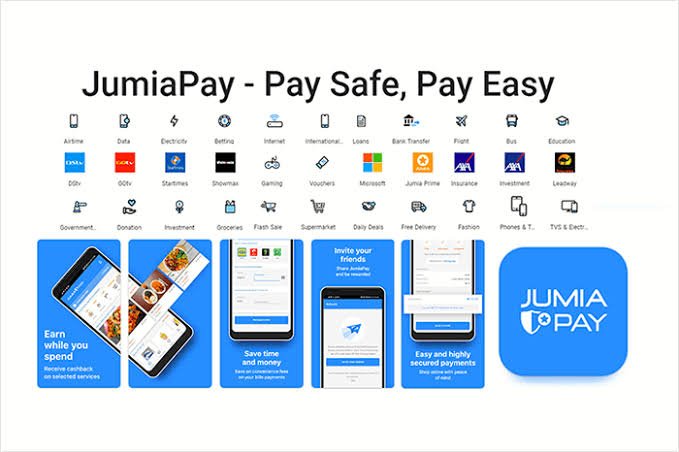Payment processing systems play a crucial role in facilitating seamless transactions between buyers and sellers. One such system that has made significant progress in Nigeria is JumiaPay.
As a vital part of Jumia’s e-commerce platform, JumiaPay addresses the unique challenges of online payments in Nigeria, a country where traditional cash-on-delivery methods have long dominated.
With features designed to enhance security and user experience, the JumiaPay Mobile App stands out as a reliable solution for consumers and merchants alike.
This article talks about JumiaPay, exploring its origins, functionality, services, user experience, market impact, challenges, and future prospects.
Background of JumiaPay
JumiaPay was established in response to the alarming rate of payment failures in Nigeria, which reached as high as 60% in 2016.
This high failure rate was primarily due to a lack of trust in online payment systems and the prevalence of cash-on-delivery transactions.
Recognizing the need for a more reliable payment solution, Jumia launched JumiaPay to facilitate digital payments and improve the overall e-commerce experience for Nigerian consumers.
As Africa’s leading e-commerce platform, Jumia has cemented its status as a pioneer in the region’s online retail space.
JumiaPay serves not only Nigeria but also operates across several other African countries, providing a third-party payment solution that enhances Jumia’s marketplace.
The platform has become integral to Jumia’s operations, enabling secure transactions for millions of users.
Related: A Comprehensive Review of JUMO: Analyzing Its Services, Features & User Experience
How Does JumiaPay Work?
Understanding how JumiaPay functions is essential for appreciating its role in Nigeria’s e-commerce ecosystem. Below is how it works:
1. Payment Mechanism
JumiaPay facilitates payments through various channels including banks, mobile devices, and online platforms.
Users can make transactions directly through the JumiaPay Mobile App, which integrates with banks via an open API.
This allows for seamless connectivity between users’ bank accounts and the payment system, ensuring that transactions are processed efficiently.
2. Security Features
Security is important in digital transactions. JumiaPay uses SSL encryption to protect user data and ensure secure data handling during transactions.
Additionally, it uses One-Time Password (OTP) verification to add an extra layer of security for each transaction, thereby building trust among users who may be skeptical about online payments.
3. User Registration Process
The registration process for JumiaPay is straightforward. Users must sign up by linking their bank accounts using their NUBAN (Nigerian Uniform Bank Account Number).
For merchants, there are specific verification processes and requirements to ensure that only legitimate businesses can utilize the platform for transactions.
Services Offered by JumiaPay
JumiaPay provides a diverse range of services that cater to various consumer needs, such as:
1. Payment Services
The platform supports multiple transaction types including:
- Online shopping
- Bill payments
- Airtime purchases
- Utility payments
This versatility makes JumiaPay a one-stop solution for many financial transactions that users would typically conduct separately.
2. Additional Features
In addition to basic payment services, JumiaPay offers:
- Instant refunds for failed transactions
- Cashback and rewards programs for users
These features not only enhance user satisfaction but also encourage more frequent use of the platform.

About the JumiaPay Mobile App
The JumiaPay Mobile App is designed with user experience in mind.
The app boasts an intuitive user interface that makes it easy for users to navigate through various services.
Its accessibility via mobile devices allows users to manage multiple transactions from anywhere at any time.
Also, JumiaPay provides robust customer support mechanisms to address complaints and facilitate refunds.
The platform’s customer protection policies ensure secure transactions, further enhancing user confidence in digital payments.
Related: GTPay Review: Analyzing Its Services, Features & User Experience
JumiaPay’s Market Reach and Impact
JumiaPay has made significant strides since its inception, which includes:
1. User Base Statistics
As of recent reports, Jumia has over 5 million customers across Africa, with a substantial number actively using JumiaPay for their transactions.
The growth metrics indicate a steady increase in both user engagement and transaction volume since the platform’s launch.
2. Partnerships and Collaborations
A notable collaboration with Mastercard has enhanced JumiaPay’s service offerings. This partnership has allowed for co-branded products that improve transaction efficiency and security.
3. Competitors in the Market
Despite its successes, JumiaPay faces competition from other players like KongaPay.
These competitors offer similar services but differ in their approach to market penetration and customer engagement strategies.
Challenges Faced by JumiaPay
While JumiaPay has achieved considerable success, it also encounters several challenges, such as:
1. Market Competition
The competitive landscape in Nigeria’s payment processing sector is intense. Numerous startups and established companies are vying for market share, making it imperative for JumiaPay to continuously innovate to maintain its lead.
2. Trust Issues
Consumer skepticism towards digital payments remains a significant hurdle. Many potential users still prefer cash-on-delivery due to fears of fraud or transaction failures.
Building trust through robust security measures and effective communication is crucial for expanding its user base.
3. Regulatory Environment
Navigating Nigeria’s complex financial regulations poses additional challenges for digital payment systems like JumiaPay.
Compliance with local laws while ensuring operational efficiency requires ongoing attention from management.
What is the Future Outlook of JumiaPay?
Looking ahead, there are promising opportunities for growth within the Nigerian market.
JumiaPay has significant potential for expansion into new markets or services. As more consumers embrace digital payments, there is an opportunity to capture a larger share of this growing market segment.
Additionally, innovations such as blockchain technology or artificial intelligence could further enhance user experience and security measures within the platform.
Embracing these advancements will be critical for staying competitive in an increasingly tech-driven world.
Conclusion
JumiaPay has become one of the cornerstones of Nigeria’s e-commerce ecosystem by providing secure and efficient payment processing solutions.
Its contributions have not only facilitated smoother transactions but have also fostered greater consumer trust in digital payments.
As Nigeria continues to advance technologically, robust payment processing systems like JumiaPay will play an essential role in supporting growth and innovation within the online commerce space.
Frequently Asked Questions
1. What is JumiaPay?
JumiaPay is an online payment processing system developed by Jumia to facilitate secure digital transactions across various platforms including online shopping and bill payments.
2. How does the JumiaPay Mobile App work?
The app allows users to link their bank accounts securely using NUBAN numbers and enables them to make various types of payments such as shopping, utility bills, and airtime purchases seamlessly through their mobile devices.
3. What security measures does JumiaPay implement?
JumiaPay employs SSL encryption for data protection and OTP verification for each transaction to ensure secure processing of payments.
4. What challenges does JumiaPay face in Nigeria?
JumiaPay faces challenges such as intense market competition, consumer skepticism towards digital payments, and navigating complex regulatory environments that affect its operations.





